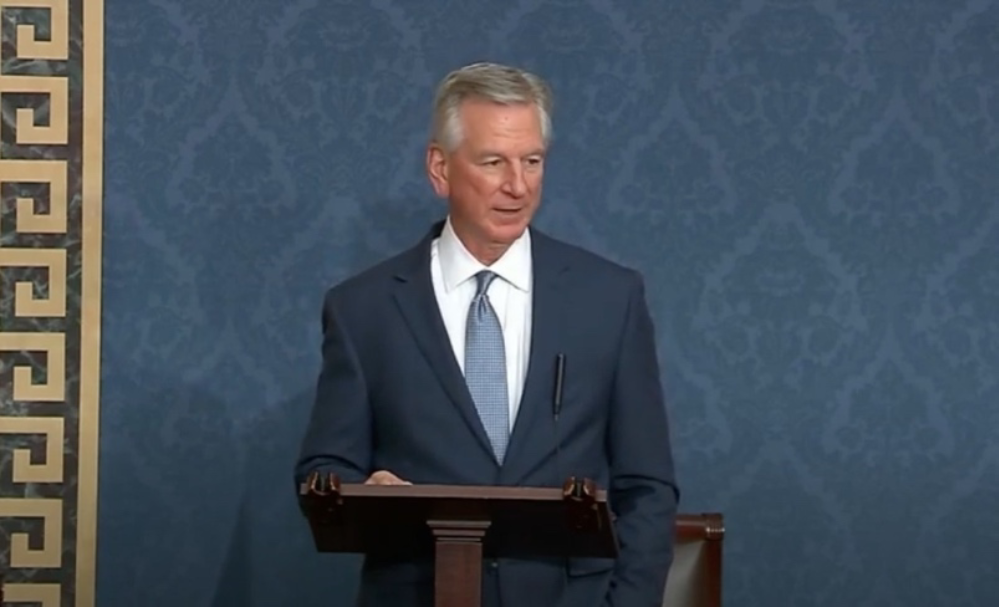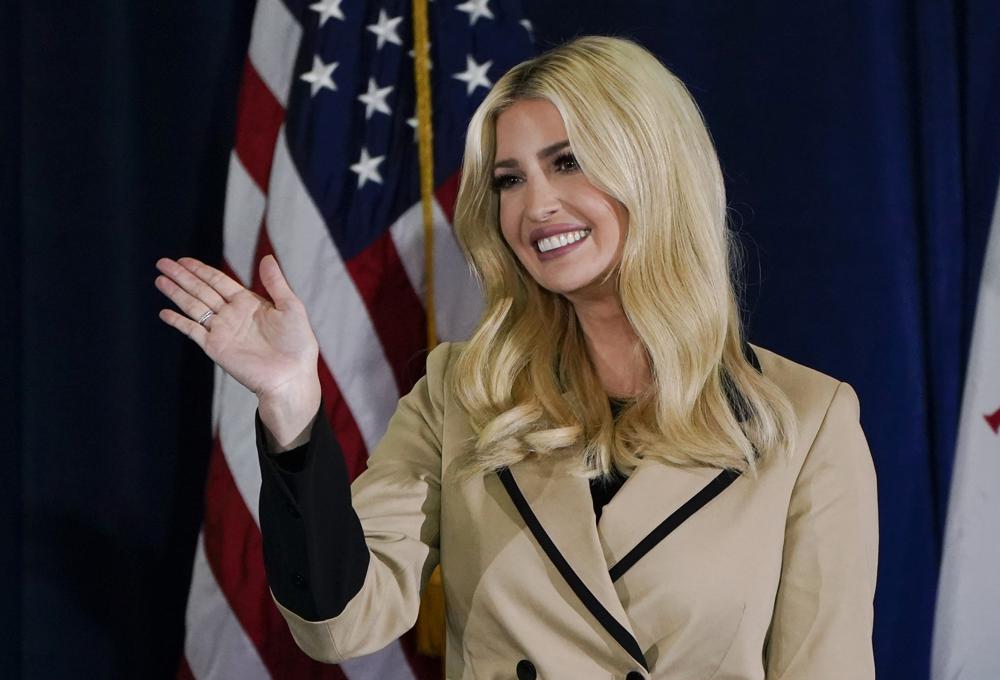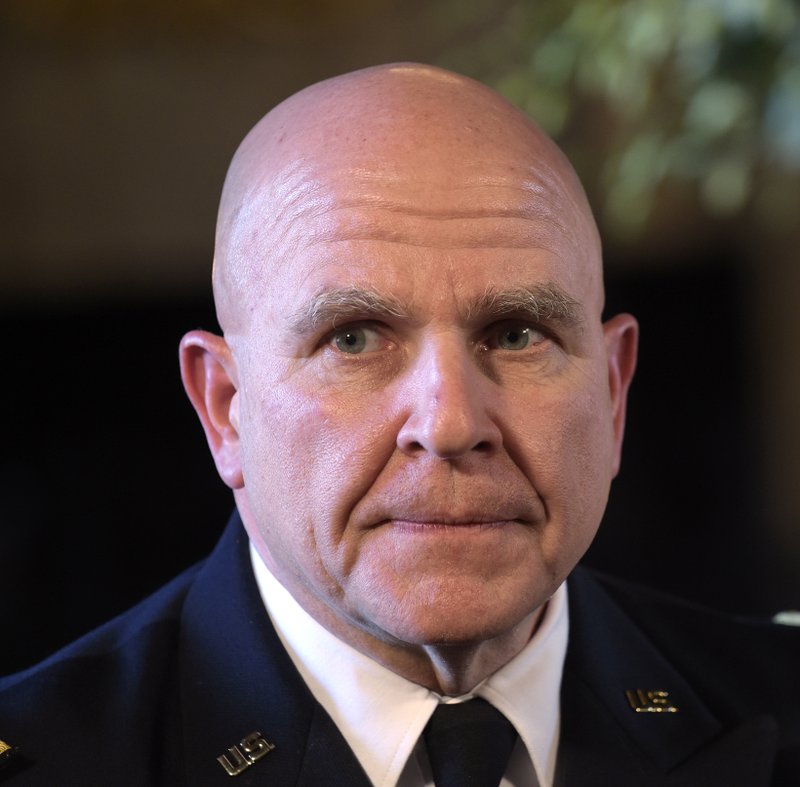Tommy Tuberville: “We don’t need the war in Ukraine to turn into Vietnam”

On Wednesday, U.S. Senator Tommy Tuberville told Alabama reporters that he supports the Ukrainians in their fight against Russian aggression. However, he believes that NATO and Europe must shoulder more of the load. “We are already over $32 billion in debt. Whatever it takes is going to run out. We don’t need this war, and we don’t need this war to turn into Vietnam,” Tuberville stated. “I have been for Ukraine ever since it started,” Tuberville told Alabama reporters on Wednesday. “[Vladimir] Putin is a murderer. He should never should have done this. There have been hundreds of thousands of people killed – on both sides.” “I am really disappointed how this thing really got started,” Tuberville said. “I was in Ukraine a few months before it started. We were told – I was told by President [Volodymyr] Zelenskyy himself they are coming. They are going to come across the border. They are going to try to take more land. Even may try to take the whole country, but we couldn’t get the Biden administration to gear up and to start putting things in place on the border to help the Ukrainians. We were behind, stay behind. This administration was behind. We stay behind,” Tuberville said. “They (the Ukrainians) are holding their own, but they are playing against a major, a big major country that is right on their border,” Tuberville said. “We have to have more support from NATO.” “I voted against a lot of the funding,” Tuberville said. “None of us are sure if the proper oversight is going on. There are a lot of Republicans, where all – including me, who are getting antsy about continuing to fund what is going on over there. We need Europe and NATO to step up and do their part. We are carrying the load. The American taxpayers are carrying the load. Europe needs to be carrying the load also.” “President [Joe] Biden says ‘whatever it takes.’ Well, we are already over $32 billion in debt. Whatever it takes is going to run out,” Tuberville told the Alabama Press. “We don’t need this war, and we don’t need this war to turn into Vietnam that is going to last forever and ever. We can’t afford it. We need to get our focus on China – really our number one adversary around the world.” During a Senate Armed Services Committee (SASC) hearing Tuesday covering Russia’s war in Ukraine, Sen Tuberville spoke with Lieutenant General (Ret.) Keith Kellogg and foreign policy experts from Georgetown University and RAND Corporation about the dangers of China’s potential entry into the conflict. Senator Tuberville and his SASC colleagues also discussed the threat of Russian escalation, the possible use of nuclear weapons, and the necessary course of action for the United States. “I was in Ukraine six months before this war started and talked to President Zelensky, and he knew this was coming,” Sen. Tuberville said. “They were putting troops on the border of Belarus, all over the place, building up, knowing it was coming. We didn’t do one thing. We said it was going to be a small incursion. That’s what President Biden said. We’re coming off Afghanistan, where we didn’t look very smart. What would we do different now, General, in your eyes? Now, we are doing it, though it seems like we are one step behind in everything that we are doing. What should we have done different at the beginning? Because it looked like we were going to be the defender of the free world. We need to learn from our mistakes, and we made huge mistakes at the beginning of this.” “Yes, Senator, thanks for your question. As a former and retired military officer, I’m a little bit disappointed in the military and the intelligence community that either didn’t relay this or didn’t believe it as well,” Gen. Kellogg said. “You know, recall, we had very senior officers say, one, Ukraine would fall in three days of the invasion and try to get President Zelensky a ride out of town. And that’s when he made the comment; I don’t need a ride. I need ammunition. You know, the fact is, we just didn’t really believe it, and we didn’t look at it hard. I would really question our intelligence communities, all of them, and also the military, why their decision-making was so poor in foreseeing this. Most of us saw it. We saw the indicators. I’m a big believer in indicators and patterns, and patterns and indicators were there. So, I think it was a fault somewhere in our systems that we didn’t convince ourselves that it was really going to happen. Part of it may have been a misunderstanding of President Putin himself, and they just didn’t believe he would do it. I’ve actually heard commentators saying up until the day before the invasion, he wasn’t going to do it. Yes, he was. And if you read Putin, and I had a fortune when I was in the National Security Council, I brought Dr. Fiona Hill in on the NSC team. She came out of Brookings, and she’s a very well-read person on Putin. And she says when he says something, believe it, he’s going to do it. We didn’t believe it.” “General Kellogg, do you have a clear sense of the overall U.S. strategy in Ukraine? And what does victory look like for Ukraine?” Tuberville asked. “I do not have an overall view of what the current strategy in Ukraine is,” Kellogg said. “I believe we should have one. And I think you have to put, in-state, you have to put Russia’s army at risk in Ukraine. Putin has to understand he’s got two options, lose his army or leave. If his army loses and is defeated, he falls.” “Can Ukrainians win it on their own?” Tuberville asked. “No. Let me rephrase, they can win it on their own if we give them the equipment to do it,” Kellogg answered. “Okay. What’s the most dangerous course of action for the United States when it comes to this conflict?” Tuberville asked. “What puts us in harm’s way?” “By
January 6 committee requests interview with Ivanka Trump

The House committee investigating the U.S. Capitol insurrection is asking Ivanka Trump, daughter of former President Donald Trump, to voluntarily cooperate as lawmakers make their first public attempt to arrange an interview with a Trump family member. The committee sent a letter Thursday requesting a meeting in February with Ivanka Trump, a White House adviser to her father. In the letter, the committee chairman, Rep. Bennie Thompson, D-Miss., said Ivanka Trump was in direct contact with her father during key moments on January 6, 2021, when Trump supporters stormed the Capitol in an effort to halt the congressional certification of Joe Biden’s presidential win. The riot followed a rally near the White House where Donald Trump had urged his supporters to “fight like hell” as Congress convened to certify the 2020 election results. The committee says it wants to discuss what Ivanka Trump knew about her father’s efforts, including a telephone call they say she witnessed, to pressure then-Vice President Mike Pence to reject those results, as well as concerns she may have heard from Pence’s staff, members of Congress and the White House counsel’s office about those efforts. “Ivanka Trump just learned that the January 6 Committee issued a public letter asking her to appear,” her spokesperson said. “As the Committee already knows, Ivanka did not speak at the January 6 rally.” The committee cited testimony that Ivanka Trump implored her father to quell the violence by his supporters, and investigators want to ask about her actions while the insurrection was underway. “Testimony obtained by the Committee indicates that members of the White House staff requested your assistance on multiple occasions to intervene in an attempt to persuade President Trump to address the ongoing lawlessness and violence on Capitol Hill,” Thompson wrote. The letter is the committee’s first attempt to seek information from inside the Trump family. Earlier this week, it issued subpoenas to lawyer Rudy Giuliani and other members of Trump’s legal team who filed meritless court challenges to the election that fueled the lie that the race had been stolen from Trump. The committee is narrowing in on three requests to Ivanka Trump, starting with a conversation alleged to have taken place between Donald Trump and Pence on the morning of the attack. The committee said Keith Kellogg, who was Pence’s national security adviser, was also in the room and testified to investigators that Trump questioned whether Pence had the courage to delay the congressional counting of the electoral votes. The Constitution makes clear that a vice president’s role is largely ceremonial in the certification process, and Pence had issued a statement before the congressional session that laid out his conclusion that a vice president could not claim “unilateral authority” to reject states’ electoral votes. “You were present in the Oval Office and observed at least one side of that telephone conversation,” the letter to Ivanka Trump said, adding that the committee “wishes to discuss the part of the conversation you observed” between the then-president and Pence. The letter also mentioned a message, in the days before the scheduled vote certification on January 6, 2021, between an unidentified member of the House Freedom Caucus to then-White House chief of staff Mark Meadows with an explicit warning: “If POTUS allows this to occur … we’re driving a stake in the heart of the federal republic.” POTUS is an abbreviation for President of the United States. The other requests in the letter to Ivanka Trump concern conversations after Donald Trump’s tweeted, “Mike Pence didn’t have the courage to do what should have been done to protect our Country and our Constitution.” The committee said White House staff and even members of Congress requested Ivanka Trump’s help in trying to convince her father that he should address the violence and tell rioters to go home. “We are particularly interested in this question: Why didn’t White House staff simply ask the President to walk to the briefing room and appear on live television — to ask the crowd to leave the capital?” Besides the subpoenas issued this week, the committee had a victory Wednesday when the Supreme Court rejected a bid by Trump to block the release of White House records sought by lawmakers. The National Archives began to turn over the hundreds of pages of records to the nine-member committee almost immediately. They include presidential diaries, visitor logs, speech drafts, and handwritten notes dealing with January 6 from the Meadows’ files. The committee’s investigation has touched nearly every corner of Trump’s orbit in the nearly seven months since it was created, from strategist Steve Bannon to media companies such as Twitter, Meta, and Reddit. The committee says it has interviewed nearly 400 people and issued dozens of subpoenas as it prepares a report set for release before the November elections. Still, the committee has run into roadblocks from some of Trump’s allies, including Bannon and Meadows, who have refused to fully cooperate. Their resistance has led the committee to file charges of contempt of Congress. The seven Democrats and two Republicans on the committee have also faced defiance from fellow lawmakers. House Minority Leader Kevin McCarthy, R-Calif., and GOP Reps. Scott Perry of Pennsylvania and Jim Jordan of Ohio have denied the committee’s requests for voluntary cooperation. While the committee has considered subpoenaing fellow lawmakers, that would be an extraordinary move and could run up against legal and political challenges. The committee says the extraordinary trove of material it has collected — 35,000 pages of records so far, including texts, emails, and phone records from people close to Trump — is fleshing out critical details of the worst attack on the Capitol in two centuries. The next phase of the investigation will include a series of public hearings in the coming months. Republished with the permission of the Associated Press.
Donald Trump taps military strategist as national security adviser

President Donald Trump has tapped Army Lt. Gen. H.R. McMaster, a prominent military strategist known as a creative thinker, as his new national security adviser, replacing the ousted Michael Flynn. Trump announced the pick Monday at his Palm Beach, Florida, club and said McMaster is “a man of tremendous talent and tremendous experience.” The president’s choice further elevated the influence of military officers in the new administration. Trump, who has no military or foreign policy experience, has shown a strong preference for putting generals in top roles. In this case, he tapped an active-duty officer for a post that’s sometimes used as a counterweight to the Pentagon. McMaster, who wore his uniform for the announcement, joins Defense Secretary Jim Mattis and Homeland Security Secretary John Kelly, both retired generals, in Trump’s inner circle of national security advisers. The White House said Monday McMaster plans to remain on active military duty. He will take on the challenge of leading a National Security Council that has not adjusted smoothly to Trump’s leadership. The president suggested he does not trust holdovers from the Obama administration and complained about leaks to reporters. His decision to put his top political adviser on the senior committee of the National Security Council drew sharp criticism. On Friday, the head of the council’s Western Hemisphere division was fired after he criticized Trump’s policies and his inner circle of advisers. Trump said Monday that retired Army Lt. Gen. Keith Kellogg, who had been his acting adviser, will now serve as the National Security Council chief of staff. He also said he would be asking John Bolton, a former U.S. ambassador to the United Nations, to work with them in a “somewhat different capacity.” McMaster is viewed as soldier-scholar and creative thinker. He has a doctoral degree in history from the University of North Carolina and has been heavily involved in the Army’s efforts to shape its future force and its way of preparing for war. He is currently the director of the Army Capabilities Integration Center, a sort of military think tank, at Fort Eustis, Virginia. Outside of the Army, he may be best known for his 1997 book, “Dereliction of Duty,” a searing indictment of the U.S. government’s mishandling of the Vietnam War and an analysis of what he called the “lies that led to Vietnam.” The book earned him a reputation for being willing to speak truth to power. McMaster commanded troops in both American wars in Iraq — in 1991, when he fought in a storied tank battle known as the Battle for 73 Easting, and again in 2005-2006 in one of the most violent periods of the insurgency that developed after the U.S.-led invasion in 2003. He is credited with using innovative approaches to countering the insurgency in the northern Iraqi city of Tal Afar when he commanded the 3rd Armored Cavalry Regiment. He later served as a special adviser to the top U.S. commander in Iraq. McMaster was Trump’s second choice to replace Flynn, who has been under FBI investigation for his contacts with Russian officials. Trump dismissed Flynn last week after revelations that the adviser had misled Vice President Mike Pence about the nature of his discussion with Russia’s ambassador to the U.S. during the presidential transition. Trump said in a news conference Thursday that he was disappointed by how Flynn had treated Pence, but did not believe Flynn had done anything wrong by having the conversations. Trump’s first choice to replace Flynn, retired Vice Adm. Robert Harward, turned down the offer. Trump announced his choice sitting between McMaster and Kellogg in a luxurious living room at the resort property. The president told reporters that Vice President Mike Pence had been involved in the process, but he did not elaborate. Trump brought four candidates for the position to Mar-a-Lago over the weekend for in-person interviews, McMaster among them. McMaster called the appointment a “privilege.” It was not clear how closely McMaster’s and Trump’s views align. On Russia, McMaster appears to hold a much dimmer view than Trump of Moscow’s military and political objectives in Europe. In remarks at the Center for Strategic and International Studies in May 2016, McMaster said Russia managed to annex Crimea and intervene militarily in eastern Ukraine “at zero cost” from the international community. McMaster said Moscow’s broader goal is to “collapse the post-Cold War security, economic and political order in Europe and replace that order with something that is more sympathetic to Russian interests.” In his current role, McMaster has been studying the way Russia developed and executed its campaigns in Crimea and Ukraine, where it used what some call “hybrid warfare” — part political, part disinformation, part military. Sen. John McCain, an increasingly vocal Trump critic, called McMaster an “outstanding” choice. “He is a man of genuine intellect, character, and ability. He knows how to succeed,” he said in a statement. “I give President Trump great credit for this decision, as well as his national security cabinet choices.” The position of national security adviser does not require Senate confirmation. Republished with permission of The Associated Press.

